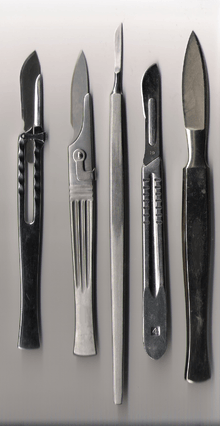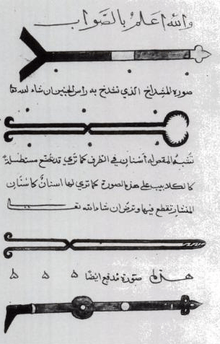Surgical instrument
A surgical instrument is a tool or device for performing specific actions or carrying out desired effects during a surgery or operation, such as modifying biological tissue, or to provide access for viewing it. Over time, many different kinds of surgical instruments and tools have been invented. Some surgical instruments are designed for general use in surgery, while others are designed for a specific procedure. Accordingly, the nomenclature of surgical instruments follows certain patterns, such as a description of the action it performs (for example, scalpel, hemostat), the name of its inventor(s) (for example, the Kocher forceps),[1] or a compound scientific name related to the kind of surgery (for example, a tracheotome is a tool used to perform a tracheotomy).


The expression surgical instrumentation is somewhat interchangeably used with surgical instruments,[2] but its meaning in medical jargon is the activity of providing assistance to a surgeon with the proper handling of surgical instruments during an operation, by a specialized professional, usually a surgical technologist or sometimes a nurse or radiographer.
Classification
There are several classes of surgical instruments:
- Graspers,[3] such as forceps
- Clamps and occluders for blood vessels and other organs
- Needle drivers, also known as needle holders, used to hold suture needle while it is passed through tissue and to grasp suture while instrument knot tying.
- Retractors, used to spread open skin, ribs and other tissue
- Distractors, positioners and stereotactic devices
- Mechanical cutters (scalpels, lancets, drill bits, rasps, trocars, Ligasure, Harmonic scalpel, surgical scissors, rongeurs etc.)
- Dilators and specula, for access to narrow passages or incisions
- Suction tips and tubes, for removal of bodily fluids
- Sealing devices, such as surgical staplers
- Irrigation and injection needles, tips and tubes, for introducing fluid
- Powered devices, such as drills, cranial drills and dermatomes
- Scopes and probes, including fiber optic endoscopes and tactile probes
- Carriers and appliers for optical, electronic, and mechanical devices
- Ultrasound tissue disruptors, cryotomes and cutting laser guides
- Measurement devices, such as rulers and calipers
An important relative distinction regarding surgical instruments is the amount of bodily disruption or tissue trauma that their use might cause the patient. Terms relating to this issue are 'atraumatic' and minimally invasive.
References
- "Kocher's Forceps Medical Definition | Merriam-Webster Medical Dictionary". health-rose.com/products.php?live=53_78_0_0. Retrieved 2016-02-15.
- Renee Nimitz, Surgical Instrumentation: an Interactive Approach (Saunders, 2010) 1416037020, pxiii
- "Laparoscopic graspers", Laparoscopic.md. Accessed 16 August 2013